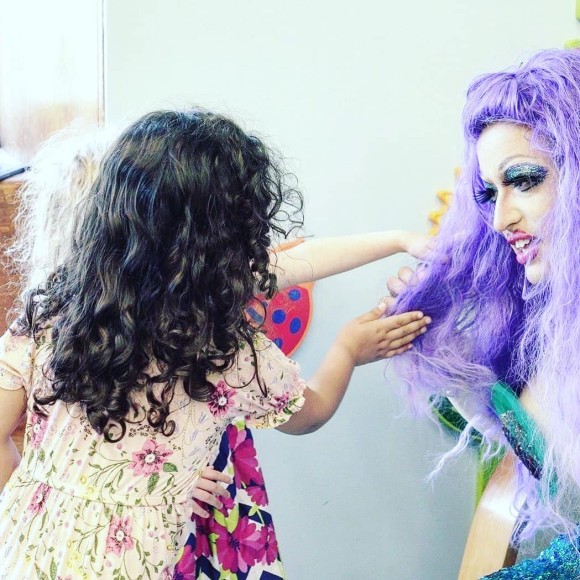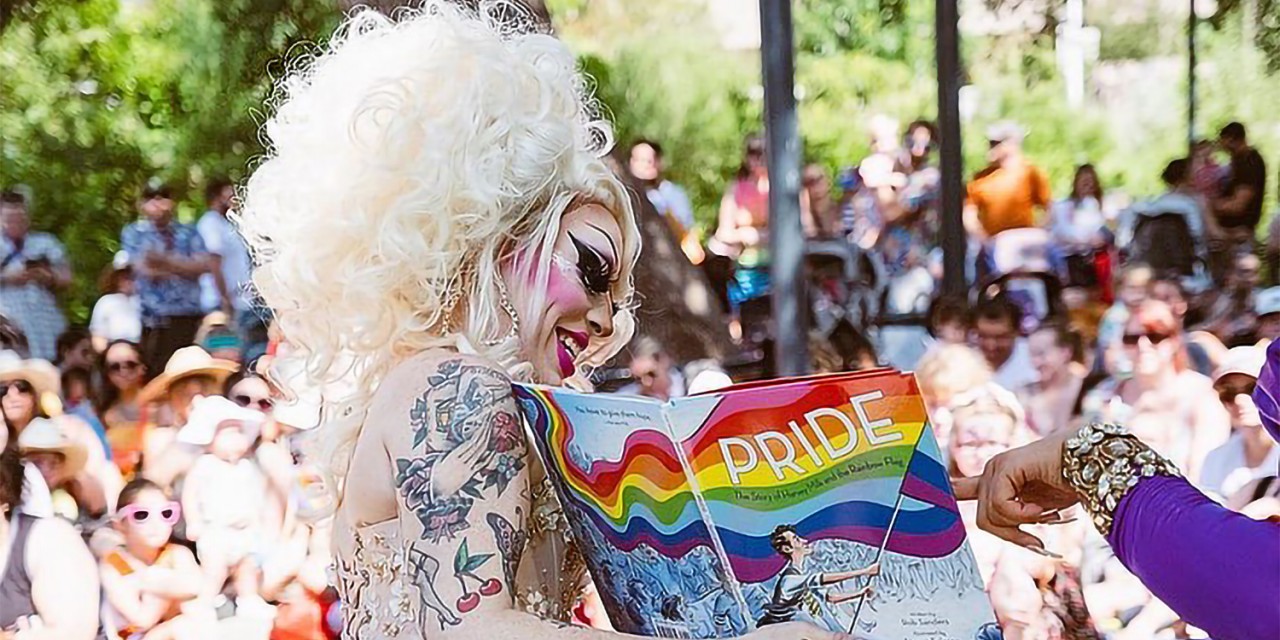Drag Story Hour (DSH) is a storytelling and performance organization that uses the art of drag to read books to children in libraries, schools, and bookstores. Beginning in 2015 as a local initiative in San Francisco under the guidance of Michelle Tea, Julián Delgado Lopera, Virgie Tovar, and RADAR Productions, the operation has since grown into an international organization with over 30 chapters worldwide.
Harris Kornstein, assistant professor of public and applied humanities at the University of Arizona, is on DSH’s Board of Directors, and also works as one of the organization’s drag storytellers performing under their drag persona, Lil Miss Hot Mess. While initially Kornstein kept their work as a drag storyteller intentionally separate from their academic profile, things soon became more integrated. A few years into storytelling with DSH, Kornstein was approached by a friend at Stanford University to perform at an event at the School of Education. After the event, Kornstein and their friend, Harper B. Keenan, who is now professor of gender & sexuality in education at the University of British Columbia, had a conversation about some of the ways in which DSH does important cultural and pedagogical work by blending drag performance and storytelling for children. The pair ended up writing an article in Curriculum Inquiry about the incorporation of drag as a queer storytelling modality into early childhood education, arguing that elements of DSH’s work such as play as praxis, aesthetic transformation, strategic defiance, destigmatization of shame, and embodied kinship form important opportunities for educators and students to develop a sense of queer imagination. In addition, Kornstein has also published two popular children's books, The Hips on the Drag Queen Go Swish, Swish, Swish (2020) and If You’re a Drag Queen and You Know It (2022), both of which are routinely used for DSH’s storytelling sessions. In 2020, they recorded a video of themselves reading their book as their drag persona, Lil Miss Hot Mess, for PBS affiliate WNET.
While wearing multiple hats (storyteller, author, board member, professor) provides plenty of opportunities for interdisciplinary work, Kornstein said that ensuring that this work is legible to a variety of audiences is something that has become central to how they operate in each of these spaces. “There’s always a background thought of how do I make drag legible to children? How do we speak using the vocabularies and grammars of drag, but in a way that’s age appropriate and that children will appreciate?” Kornstein explained. “I think a lot as a performer about things like what kinds of humor children will understand and respond to, versus what's more typical at an adult drag show.” This element of the work that DSH does is especially important in terms of trying to forge the best connections possible between storytellers and their young audiences. To capture the creative spirits of as many children as possible, a typical storytelling session might include reading from three or four books, usually with LGBTQ+ themes, as well as singing songs, doing some group movement, and oftentimes craft activities such as coloring or face-painting. Depending on the strengths of the performers in each individual chapter, storytellers sometimes also present child-friendly lip-sync performances to their young audiences.
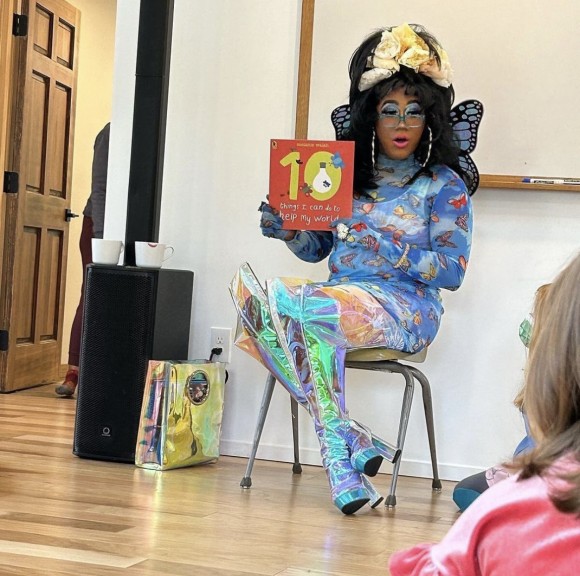
Across DSH’s many chapters, each storytelling event looks a little different. “We like to think about chapters being locally autonomous and independently run, having the authority to be responsive to issues and themes in their communities,” Kornstein said. As an example, Kornstein mentioned that the DSH chapter based in New York City runs story hours specifically aimed at neurodiverse and disabled children, as well as middle school and high school programs that have included sewing workshops and makeup tutorials. While different chapters have ultimate control and responsibility for their own operations, DSH as an international organization is there as an umbrella for administrative, financial, and curricular support.
Given that DSH as an organization prefers to prioritize stories that are written by and center LGBTQ+, BIPOC, and other marginalized people and narratives, it is perhaps unsurprising that not everyone receives their work with an open mind. Drag events for young people are frequently targeted by hate groups, and DSH has not managed to avoid this type of unwelcome attention, despite the significant amount of thought that the organization puts into its messaging.
“We’ve seen opposition almost since the very beginning,” Kornstein said. “It started in some of the more rural and conservative areas, but also quickly found its way to places like San Francisco and New York.” In the early days of the initiative, countering the kind of backlash that DSH events faced was not always seen as a priority by arts and humanities organizations, and even some larger LGBTQ+ organizations. Kornstein attributes this to a perception that drag storytelling events were cutesy and relatively unimportant kinds of representation for the queer community. While this perception has largely changed now due to sustained media coverage, Kornstein also draws a distinction between this form of backlash and broader forms of discrimination like book bans and more generalized anti-drag behavior. “We saw ourselves as the canaries in the coal mine—we saw this rise of the false rhetoric around ‘grooming’ and ‘pedophilia’ and the overt sexualization and condemnation of queer people,” Kornstein stated. Additionally, they also note that this backlash feeds into broader attacks on public educational and cultural institutions—and the humanities and arts more broadly—that seek to limit creative expression and foreclose political imagination.
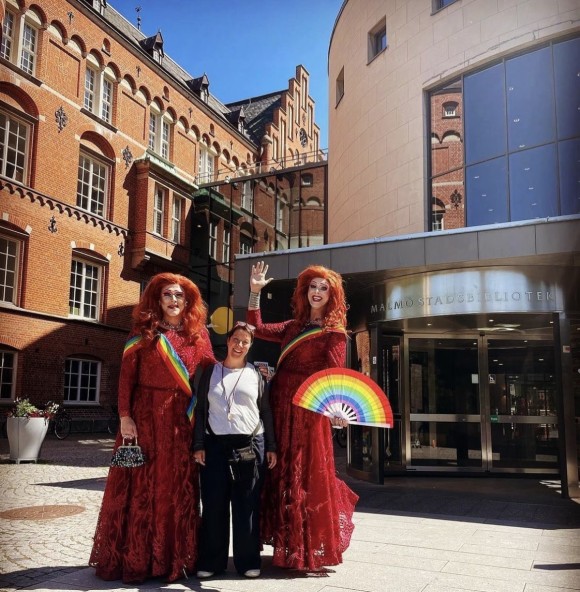
During Pride Month 2022, the Proud Boys violently disrupted one of DSH’s story hours in San Lorenzo. Kornstein believes that the media attention following the event “both brought attention to the backlash we were facing, and in some ways also invited more copycat kinds of behavior.” In response to the increasing risk of this kind of threat, DSH launched a pilot program called “Shields Up!,” which explores putting more effective community-based safety protocols in place to help mitigate the risk of future disruptions. This community safety program offers chapter organizers, venues, and storytellers training sessions on situational awareness, as well as mobilizing volunteers (who DSH calls the “Royal Guard”) to be safety marshalls in and outside of events. However, despite the elevated levels of hostility that the organization has seen, their core programming has not changed dramatically.
Performing as Lil Miss Hot Mess, Kornstein has personally experienced direct attacks on their drag storytelling work in the form of censorship. When Kornstein produced the storytelling video for PBS, it was initially published on PBS’s website and sent out to other regional affiliates, but received pushback from hate groups that caused the video to be pushed to a backchannel online. The censorship didn’t stop there, however, as the Republican Governor of Oklahoma, Kevin Stitt, this year cited Kornstein’s video as a reason to veto funding for Oklahoma’s PBS affiliate, among other condemnations from high-profile conservative politicians and spokespeople. In July 2023, DSH decided to close their Miami chapter due to anti-LGBTQ+ legislation, citing concerns for the physical safety of their storytellers and chapter directors.
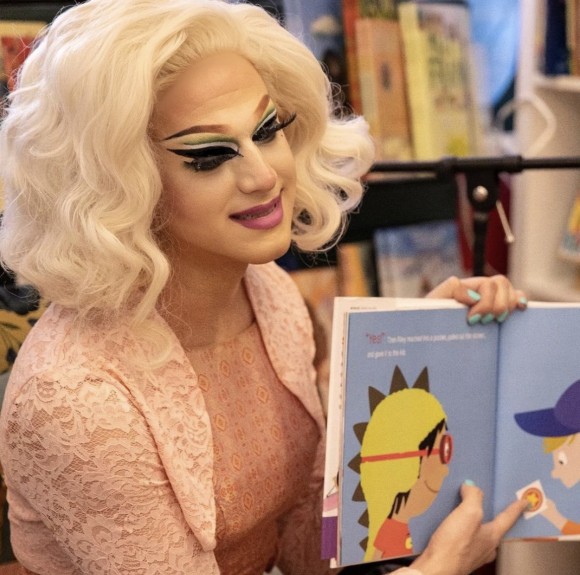
Kornstein says that they wish that the general public had more context for drag as an art form. Drag has a long history and thrives on its multiplicity—it can easily be adapted for children and families while also providing a space for the irreverence that adult drag shows in clubs invite. “When I describe drag, both to children and in publications, I oftentimes focus less on drag as gender play—which is not to downplay that element—and instead think about the other cultural work that drag does in terms of being a form of play that more broadly activates people’s imaginations and disrupts binaries, not just of masculinity and femininity, but also of truth and fiction, or publicness and privateness,” Kornstein said. For Kornstein, emphasizing this kind of viewpoint highlights the intersection between performance, the arts, literature, and the humanities that drag invites its audiences to navigate.
And it’s an intersection that DSH’s audiences are willing to navigate. For Kornstein, one of the biggest joys of doing this work is receiving photos, videos, and anecdotes from parents on social media, communicating that they have read Lil Miss Hot Mess’s books over and over, or that their children won’t stop talking about the characters in the back seat of the car. In one particular instance, after what had been a challenging and noisy DSH event, a trio of young children who had just missed the storytime came over to Lil Miss Hot Mess, who was dressed as a mermaid. Their genuine, inquisitive questions were a reminder of why drag storytelling is such an important example of the public humanities— “is your hair real? Why is it purple? How do you get the glitter to stick to your face like that?” Kornstein treasures the picture they took together to this day: “It really spoke to the question of ‘what does this unusual queer presence bring out in children, and what kind of questions does it allow us to ask?’”
